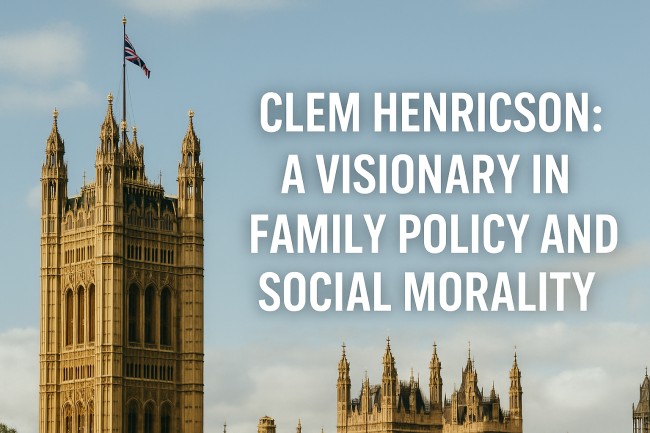Clem Henricson: A Visionary in Family Policy and Social Morality

Clem Henricson stands out as a leading voice in the fields of social policy, family dynamics, and moral philosophy in the UK. As an influential social policy analyst, writer, and thinker, Henricson’s work bridges the complex intersection between government policy, family life, and ethical considerations. Her contributions have shaped public discourse around family policy, social cohesion, and the moral fabric of society. This article explores the life, ideas, and enduring impact of Clem Henricson, highlighting why her insights remain pivotal in contemporary policy debates.
The Academic and Professional Journey of Clem Henricson
Early Career and Academic Foundations
Clem Henricson’s academic career is marked by an unwavering dedication to understanding the role of family within society and how public policy can best support familial structures. She is an Honorary Senior Fellow at the University of East Anglia and a respected member of the University of Oxford’s Centre for Research into Parenting and Children. These affiliations reflect her deep involvement in academic research and policy analysis.
Her career took a prominent turn during the era of New Labour, when she served as Director of Research and Policy at the National Family and Parenting Institute. This role positioned her at the heart of policymaking, allowing her to influence government strategies concerning families, children, and social welfare. Henricson’s work consistently emphasises the importance of understanding families not as mere units of consumption or economic actors, but as complex, moral communities that require nuanced support.
Fellowships and Contributions to Social Thought
As a Fellow of the Royal Society of Arts, Henricson has contributed to a broad range of discussions on social ethics and public policy. Her intellectual pursuits extend beyond the confines of academia, engaging with questions about the place of morality in secular governance and the tensions between individual rights and communal responsibilities. This broad philosophical approach enriches her practical policy work and lends a distinctive voice to debates around family and state.
Core Themes in Clem Henricson’s Work
The Revolution in Family Policy
One of Henricson’s most influential contributions lies in her critical examination of UK family policy over recent decades. She argues that family policy must be conceptualised independently from broader government agendas, which often subsume family concerns under economic or social policy frameworks. This independence is necessary because family life encompasses moral, emotional, and relational dimensions that cannot be fully captured by economic metrics or political convenience.
Henricson highlights how successive governments have struggled to reconcile their competing priorities—whether promoting gender equality, supporting child welfare, or encouraging economic productivity—with the intrinsic complexities of family relationships. Her vision calls for a revolution in family policy that recognises families as moral communities with rights and responsibilities distinct from those of individuals.
Morality and Public Policy
Henricson’s exploration of morality in public policy addresses one of the most pressing challenges of modern governance: how to integrate moral reasoning within secular political frameworks. In a society increasingly divided between secular and religious worldviews, she argues that public policy cannot afford to ignore questions of right and wrong, justice and care.
Rather than imposing any single moral doctrine, Henricson advocates for a pluralistic approach that fosters dialogue and respect for different moral perspectives. This approach aims to create a shared civic space where moral concerns about family, community, and social justice can inform policymaking without alienating minority views.
Bridging the Child and Family Policy Divide
Henricson, together with colleagues, has also drawn attention to the problematic divide between child-centred and family-centred policies. Many governments treat children as individual rights holders, often in isolation from the family context that shapes their well-being. Henricson argues this division overlooks the reciprocal relationships within families, where the interests of children and parents are deeply intertwined.
Her work encourages policymakers to adopt more integrated approaches that balance the needs of children with the support of the family unit as a whole. Such policies acknowledge that nurturing healthy family relationships is essential for the long-term development and happiness of children.
Clem Henricson’s Literary and Philosophical Voice
Beyond Policy: Poetry and Personal Reflection
Clem Henricson is not only a policy analyst but also a writer and poet. Her literary work complements her academic interests by exploring themes of identity, belonging, and the human condition through a deeply personal lens. Her Anglo-Swedish heritage and reflections on the natural world enrich her writing, offering a nuanced understanding of melancholy, memory, and place.
Her poems and memoirs reveal a sensitivity to the emotional dimensions of family life that policy discussions often overlook. This humanistic perspective reinforces her belief that family policy must attend to the lived experiences of individuals, not just statistics or ideological frameworks.
Why Clem Henricson’s Work Matters Today
Responding to Contemporary Family Challenges
In today’s fast-changing social landscape, family structures and roles are evolving rapidly. Rising rates of separation, diverse family forms, and shifting gender norms all pose challenges for policymakers striving to support families effectively. Clem Henricson’s work offers a vital framework for understanding these changes without reducing families to simplistic categories.
Her insistence on viewing families as moral communities helps policymakers recognise the importance of relationships, care, and responsibility in ways that economic or legal approaches alone cannot achieve. This perspective is crucial in designing interventions that respect family diversity while promoting stability and well-being.
Addressing Moral Polarisation in Public Discourse
The UK, like many Western democracies, faces increasing polarisation around questions of morality and identity. Henricson’s pluralistic approach to morality in public policy provides a hopeful path forward, emphasising dialogue and mutual respect over confrontation and exclusion.
By incorporating moral considerations into policy debates in a balanced and inclusive way, governments can better address social issues ranging from parenting support to social justice, creating more cohesive and resilient communities.
Conclusion: The Enduring Legacy of Clem Henricson
Clem Henricson’s contributions to social policy, family studies, and moral philosophy represent a significant beacon in contemporary public discourse. Her vision for a family policy rooted in moral understanding and independent from narrow political agendas remains highly relevant. In a world where families face both unprecedented challenges and opportunities, her work offers clarity, compassion, and critical insight.
Henricson’s unique blend of academic rigour, practical policymaking experience, and literary sensitivity equips her to speak powerfully to both policymakers and the wider public. As debates around family, morality, and social cohesion continue to evolve, her voice will undoubtedly remain influential and inspiring.


